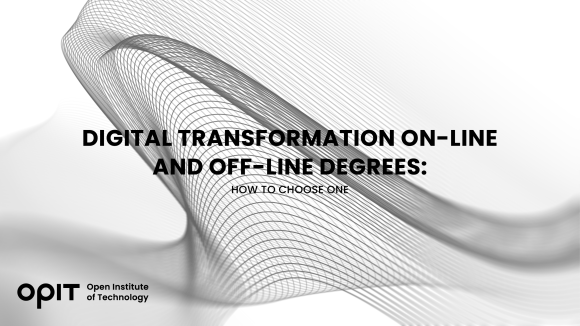

According to Statista, close to 85% of people in the EU use the Internet daily. That’s a huge population that demands a working digital infrastructure and expects online services to function seamlessly. This has resulted in extreme demands for digitizing online services across industries and sectors, with seven of the 10 most prominent companies in the world focusing on digital platforms. The process has been dubbed the Fourth Industrial Revolution.
With the advent of digital-first business accelerated by the COVID-19 pandemic, many companies are seeking experts in digital transformation to adapt to new practices. These positions are highly sought after and compensated accordingly, with the average yearly salary for digital transformation experts in Germany being €96K. In the U.S., similar positions can pay up to $200K per year.
That’s where the best online master’s degrees in digital transformation come in. Outfitted with future-proof knowledge and practices, you, too, can lead companies in making these pivotal changes. What’s important is to choose the best programs—like the one from OPIT—to give you the necessary edge and expertise in this forward-facing career.
Understanding the Value of Online Education in Digital Transformation
At its core, digital transformation is firmly entrenched in technology use and relies on many principles brought out by rapid globalization. All industries rely on technology and digital systems in one way or another, whether those are services, sales, marketing, or even production. And technology is changing more quickly than the educational systems can keep up.
With online education, the curriculum can adapt to the most recent advancements in the industries, from optimized data tracking to AI use. It allows direct access and a deeper dive into the same platforms you’ll be using during practical work. The basic practices you learn during an online curriculum can be immediately applied to real-life work and extrapolated onto custom projects in your career.
Furthermore, online teaching evens out educational opportunities across the globe. So long as you have an internet connection, you can access world-class education piloted by leaders regardless of the institution you wish to enroll in.
Online learning also allows you to set your own learning pace. It’s an excellent option if you’re already a career professional who wants to be more aligned with the needs of the modern world while still working full-time or providing for your family.
What to Look For in Top Online Digital Transformation Programs
With so many online and offline teaching programs that promise state-of-the-art education in digital transformation, it can be extremely challenging to find the best options. Here’s what you should look for in your digital transformation degree or course:
- Curriculum relevance: Digital transformation combines data science, management, and analysis and how technology affects businesses and entrepreneurs, which should be must-haves in the program. Also, look for classes that focus on engineering, finance, project or product management, and marketing.
- Innovative teaching: Due to the subject’s inherent reliance on available technology, opt for programs that have interactive tests, simulations of real-life events and platforms, and real-world practice projects.
- Industry partnerships: Look for programs supported by leading digital-first companies or those that provide internships and real-life projects as part of the dissertation.
- Accreditation: Find programs that are accepted as fully accredited Higher Education Institutions, such as the European Qualifications Framework (EQF), EAHEA, EQUIS, AMBA, and AACSB, or a member of an international body such as ENQA. It will ensure your degree is universally accepted.
- One-on-one teaching: Apart from traditional group teaching, look for courses that allow for dedicated one-on-one supplemental teaching and mentorship.
- Modern concepts: The course doesn’t need to teach just the theory of the currently dominant technologies and practices but also set up future concepts and teach a theoretical basis that accounts for future advancements.
Best Online Masters in Digital Transformation
Here are the top five options for your online digital transformation degree.
OPIT’s MSc in Applied Digital Business
Developed by industry leaders from modern educational institutions and leading companies such as Amazon, the EQF-accredited Open Institute of Technology has built the 18-month course in Applied Digital Business from the ground up. As a result, the course aims to train students for careers in digital transformation, data science, marketing, and business analysis. Due to its online-first nature, the course immerses you into the digital management sphere from the get-go, guiding you via a combination of theoretical analysis and practical projects.
In the first term, the program provides a detailed post-graduate education in data science, digital project management, problem-solving in the digital era, and customer value management analysis. In the second term, the course focuses on digital transformation, platform, and project management, as well as finance in the digital-driven economy. Finally, the course ends with a long-term research capstone project to consolidate your skills with full support from a faculty mentor.
It’s one of the most versatile programs available that will allow you to transfer your existing skills into modern practices and create opportunities for growth in both current and emerging industries. With support from global industry leaders, you get access to a wide network of peers to set you up for success.
University of Hull Online – MSc in Digital Transformation
This is a focused 2-year program in digital transformation, teaching the relevance of emerging technologies in modern digital systems, such as AI, blockchain, 3D printing, and quantum computing. However, the curriculum also contains subjects that touch on information and project management, how customers affect digital businesses, and digital innovation and strategy development. The program is fully online with a part-time commitment and optional group webinars, with the University of Hull accredited by AMBA.
University of Edinburgh Online – MSc in Digital Education
While not a focused master’s degree in digital transformation, this degree in digital education provides a well-rounded theoretical basis for working in the digital sphere. It focuses on how digitization will affect education, making it a lucrative choice for people employed in academia who want to future-proof their skills. It lasts from two to six years of part-time online study, and the university is currently ranked among the top 20 in the world.
ESSCA Online Campus – MSc in International Business 4.0 – Leading Green & Digital Transformation
ESSCA Online is a triple-accredited online school that teaches international business practices, digital transformation techniques, and sustainable operation management. It also provides an overview of blockchain, Web3, the metaverse, project management, fintech, and data analysis. It’s a 12- or 24-month program with case study programs and consulting projects with companies affiliated with ESSCA.
University of South Wales – MSc in Leading Digital Transformation
This degree course focuses on leadership, digital technologies, and innovation in the digital field, with a particular focus on the healthcare sector. However, it also teaches UX design, management within digital-only teams, and agile business practices. The program lasts for two years of part-time study (half a day each week) and is delivered through online real-time courses with guests from leading companies.
Why Opt for OPIT’s Digital Transformation Education Online
Traditional university programs commonly use the same in-person curriculum and just deliver the content online. However, OPIT’s education system is fully tuned towards online learning. You get to interact with lecturers worldwide and learn from industry leaders in real-time or on-demand. The program combines theoretical knowledge on modern topics with practical exams and assignments that put it to the test to ensure it sticks.
OPIT’s curriculum is also designed to be future-proof. The skills you learn in the master’s degree for digital transformation will be useful in solving future challenges with yet-to-be-conceived technology. It ensures that your career can last for years with minimal re-skilling and creates a path of lifetime improvement through practice.
Start Your Digital Transformation Journey
Earning a post-graduate degree in emerging technologies and concepts can push you forward as an expert for years to come. Choose OPIT as one of the best online digital transformation degree options and receive a stellar combination of theory and practice to provide you with real-world skills crucial for career development.
Have questions?
Visit our FAQ page or get in touch with us!
Write us at +39 335 576 0263
Get in touch at hello@opit.com
Talk to one of our Study Advisors
We are international
We can speak in:




